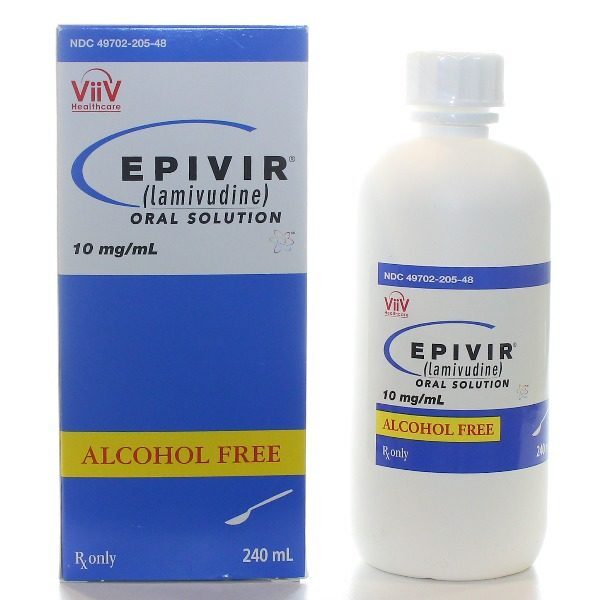Epivir (Lamivudine)

Dosages
Epivir 150 mg
| Quantity | Price per pill | Total price | |
|---|---|---|---|
| 30 | $2.37 | $71.00 | |
| 60 | $1.88 | $113.00 | |
| 90 | $1.69 | $152.00 | |
| 120 | $1.53 | $184.00 | |
| 180 | $1.38 | $248.00 | |
| 240 | $1.24 | $298.00 |
Payment & Shipping
Your order is securely packed and usually ships within 24 hours. Below is what a standard package looks like.
It is about the size of a regular letter (9.4x4.3x0.3 inches) and shows no details about what is inside.



| Shipping Method | Estimated delivery |
|---|---|
| Express Free for orders over $300.00 | Estimated delivery to the U.S.: 4-7 days |
| Standard Free for orders over $200.00 | Estimated delivery to the U.S.: 14-21 days |









Discount Coupons
- Independence Day - July 4, 2026 10% JULY410
- Labor Day - September 7, 2026 7% LABOR07
- Thanksgiving - November 26, 2026 9% THANKS09
Brand Names
| Country | Brand Names |
|---|---|
 Argentina Argentina | 3TC Amilitrap Birvac Ganvirel Heptodine Hivirux Imunoxa Kess Lamibergen Lamilea Oralmuv Ultraviral Vuclodir Zeffix |
 Australia Australia | 3TC Zeffix |
 Belgium Belgium | Zeffix |
 Brazil Brazil | Lami Lamiden Vudirax Zeffix |
 Canada Canada | 3TC Heptovir |
 Czechia Czechia | Zeffix |
 Denmark Denmark | Zeffix |
 Finland Finland | Zeffix |
 France France | Zeffix |
 Germany Germany | Kivexa Zeffix |
 Greece Greece | Zeffix |
 Hungary Hungary | Zeffix |
 Italy Italy | Zeffix |
 Malaysia Malaysia | 3TC Zeffix |
 Mexico Mexico | 3TC |
 Netherlands Netherlands | Zeffix |
 New Zealand New Zealand | 3TC Zeffix |
 Norway Norway | Zeffix |
 Poland Poland | Zeffix |
 Portugal Portugal | Zeffix |
 Spain Spain | Zeffix |
 Sweden Sweden | Zeffix |
 Turkey Turkey | Zeffix |
| Manufacturer | Brand Names |
|---|---|
| Cipla Limited | Lamivir |
FAQ
Description
General Information
Epivir is a well-known antiviral medication called a nucleoside reverse transcriptase inhibitor (NRTI). It is employed in the fight against HIV, the virus that causes acquired immunodeficiency syndrome (AIDS). However, it is ineffective for viral illnesses, colds, or the flu.
Even if you begin to feel better, you should still take this medication until the completion of the cure course. Certain illnesses could get worse if the medicine is stopped too soon.
Epivir may cause balance or vertigo issues. Until you know how this medication affects you, exercise caution when driving, operating machinery, climbing, and performing other dangerous tasks.
Epivir and alcohol together may result in flushing and rapid heartbeat. Alcohol consumption should be consumed with caution when using this medicine.
Inform a medical professional beforehand if you give Epivir to a child.
Consult a physician if any of the following apply to you or have previously affected you:
- cardiac conditions (such as irregular heart rhythms);
- kidney or liver disease;
- allergy to lamivudine or allergy to related medications, foods, colors, or preservatives;
- pancreatitis;
- issues with your muscles;
- problems with your blood;
- enzyme dysfunction;
- diabetes;
- nursing a baby, intending to get pregnant, or pregnancy.

Dosage Recommendations
| Empivir Dosage | Formulation | Dosage Strength | Frequency | Duration |
|---|---|---|---|---|
| Empivir Tablets | Oral | 200 mg | Once daily | As directed by a healthcare provider |
| Empivir Suspension | Oral | 100 mg/5 mL | Twice daily | As directed by a healthcare provider |
There are also recommendations that this medication should be taken between 150 and 300 milligrams (mg) at regular intervals, once or twice daily. When taking Epivir, drink a glass of water. It is best to drink multiple glasses of water daily to protect your kidneys. You can take it with or without food. It is preferable to take the medication with meals to reduce stomach discomfort and aid in your body's absorption of the medication.
Take this medication exactly as directed. Give the oral solution a good shake before using it to ensure that the drug is mixed evenly. Use a measuring spoon or medicine cup with a designated marking to ensure you are taking the right amount.
If you miss your dose of Epivir, take it as soon as you remember. If your next dose is almost here, skip the one you missed and stick to your usual schedule. Never take two doses at once.
Any medication taken in excess can have side effects. Notify your healthcare provider right away if you believe you have taken too much.
Which Adverse Effects Can I Notice?
- An allergic reaction (hives, face, tongue, lips, or throat swelling; breathing difficulties; skin rash or swelling; itching);
- breathing issues;
- fever and chills;
- vomiting and nausea;
- muscle stiffness, spasms, tingling in your hands or feet (tremor), or numbness;
- dark urine, loose or difficult to urinate, diarrhea;
- headache, lightheadedness, ear ringing, or hearing loss;
- bloating, gas in the stomach, cramping, indigestion, or stomach upset;
- pale skin, redness, blistering, peeling, or loosening of the skin, especially inside the mouth;
- palpitations: a rapid, hammering, or irregular heartbeat;
- weakness and exhaustion;
- issues with the liver, eyes, and skin;
- unusual bruises or bleeding;
- difficulty falling asleep.
Notify your healthcare provider right away if these continue or get worse. Other adverse effects might also arise; this is not an exhaustive list.
Interactions
What drug(s) may interact with Epivir?
- Amiloride
- Dofetilide
- Indinavir
- Metformin
- Memantine
- Procainamide
- Ribavirin
- Sulfamethoxazole
- Trimethoprim, SMX-TMP (Bactrim®, Septra®)
- Trimethoprim
- Zalcitabine, ddC
This is not a complete list of interactions. Ask your doctor if you need more detailed information. Discuss with your medical practitioner the use of your medicine with food, alcohol, or tobacco.
How to Store
Tightly cover and store at room temperature, 15 to 30 degrees Celsius (59 to 86 degrees Fahrenheit), away from moisture, direct heat, and sunshine. Store away from sinks and bathrooms. Keep medication out of children's reach and away from animals.
Consult your pharmacist or physician for additional information regarding this product's curative effects.








